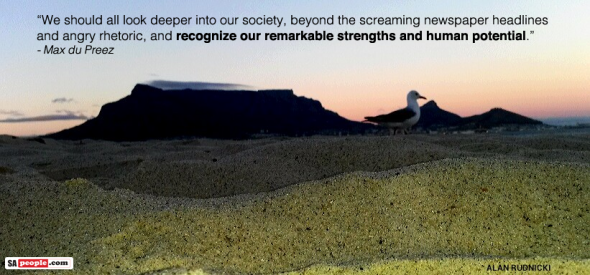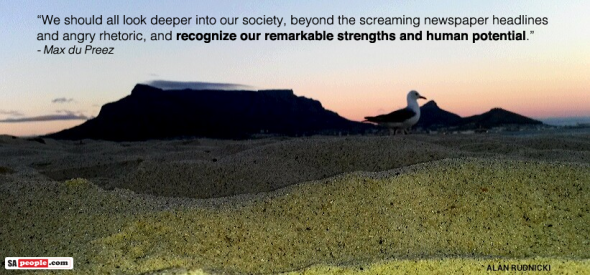
Finding Hope beyond the Screaming South African Headlines
The latest column by well known South African author, columnist and documentary filmmaker Max du Preez has resonated with many of his fellow countrymen as South Africa (and the world) seem to be living through tumultuous times. Here, with kind permission (thank you!), we republish his column: Finding Hope beyond the Screaming Headlines by Max du Preez […]

The latest column by well known South African author, columnist and documentary filmmaker Max du Preez has resonated with many of his fellow countrymen as South Africa (and the world) seem to be living through tumultuous times. Here, with kind permission (thank you!), we republish his column:

Finding Hope beyond the Screaming Headlines
by Max du Preez
South Africa is a broken place. There is a lot of aggression and intolerance about; the government is inept and corrupt; too many things don’t work; our children’s future is bleak.
Is that more or less your view of our country today? Well, let me tell you of my experiences the past week, if you’ll allow me to be a bit more personal.
On Tuesday evening I spoke to the book club of a Pretoria NG Kerk congregation on my latest book. This is the congregation most of the members of the last apartheid governments attended.
After my talk the congregants engaged me in conversation. I was expecting at least some to be very critical of my message. Instead I was questioned intensely about my ideas on how faith communities could help to heal our society; how they could help fight racism; what they could do to make the country a better place.
I left them with a feeling that these Afrikaners are committed and concerned South Africans, at peace with the democratic dispensation and not in denial about the past or about white privilege. I wish more black South Africans would get to know people like these.
The next morning my nine year-old child was unexpectedly diagnosed with insulin-dependent diabetes, a condition she will have to live with for the rest of her life.
On the advice of our family doctor, we took her to the Red Cross Children’s Hospital in Cape Town. I was apprehensive, because it is a state hospital and I have been inundated with bad news about public hospitals in South Africa.
I was astonished. The hospital offers specialist paediatric services on a par with the best in the world. It is an extraordinary place of knowledge and caring catering for children from all over the country and the rest of Africa.
My child was then admitted to Groote Schuur hospital. Nervousness again: this is a massive place and run by the provincial government, how good can it be? Like all fathers, I wanted the absolute best for my child.
After two days, my overwhelming emotion was one of gratitude and pride. I cannot imagine my child getting better care than she’s getting at Groote Schuur.
The endocrinologists are not only known as of the best in the world, they are compassionate people. The ward doctors and interns I met were all very professional, friendly, energetic and kind – my child loved and trusted them.
The sisters and nurses are something else. The way they treated my family was loving and caring and very professional. I was amazed. One would never guess that these wonderful women travelled far to hospital every day, were over-worked and under-paid. There were a few kids in the pediatric ward whose parents did not visit while I was there, and the nurses appeared to have adopted them as their own.
When my wife had a bit of an emotional moment, some of the nurses rallied around her and one prayed for her in Xhosa. I now know what Ubuntu really means.
Look beyond the interior decoration and, during visiting hours, the many people from all walks of life walking the corridors, and you might think you’re in the most expensive private hospital in the country.
Groote Schuur is a truly remarkable place and one all of us should be very proud of. This is public health at its most excellent. It is super clean, efficiently managed and offers the best specialist care one can imagine. (Even the food is good.) I suddenly feel a lot better about the income tax I pay.
The question did come up in my mind, though, why the Western Cape could run a hospital like that while many public hospitals in other provinces are places where people are neglected and die unnecessarily.
On Thursday I spoke at a mining conference in Johannesburg. I wasn’t looking forward to engage with fat cat mining bosses and managers simply focused on extracting minerals efficiently to make shareholders rich and with no concern for the workers and surrounding communities.
I didn’t meet such people. Most of those that engaged with me were conscious of the wider responsibilities mining operations have in our society and are actively looking for new solutions.
A former officer in the old SADF explained to me that his company was specializing on how mines can be run to last as long as possible and to the maximum benefit of the community rather than making huge profits.
Again, I left with the feeling that my recent depression about the state of my nation was inappropriate and misguided.
We should all look deeper into our society, beyond the screaming newspaper headlines and angry rhetoric, and recognize our remarkable strengths and human potential.
Follow Max du Preez on Twitter: @MaxduPreez
